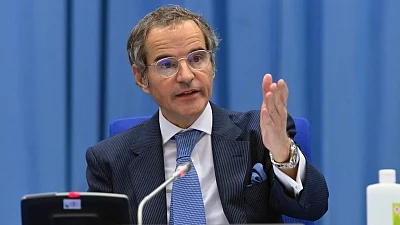New nuke research facility in Kharkiv damaged by shelling: IAEA chief
Rafael Mariano Grossi, Director General of the Vienna-based IAEA, said that a new nuclear research facility in Ukraine's Kharkiv city, has been damaged by shelling

Rafael Mariano Grossi, Director General of the Vienna-based International Atomic Energy Agency (IAEA), said that a new nuclear research facility in Ukraine's Kharkiv city producing radioisotopes for medical and industrial applications, has been damaged by shelling.
Citing Ukraine's national nuclear regulator, Grossi on Monday said the incident which took place a day earlier did not cause any increase in radiation levels at the site.
"Because the nuclear material in the facility is always sub-critical and the inventory of radioactive material is very low, the IAEA's assessment confirmed that the damage reported to it would not have had any radiological consequence," the Director General said in a statement posted on the regulator's website.
According to Grossi, Sunday's incident has "highlighted once again the risks facing Ukraine's nuclear installations during the armed conflict, adding urgency to an IAEA initiative aimed at ensuring nuclear safety and security in the country".
"We have already had several episodes compromising safety at Ukraine's nuclear sites," he added.
On February 27, Ukraine said Russian missiles hit the site of a radioactive waste disposal facility in the capital Kiev but there was no radioactive release. That came a day after an electrical transformer at a similar disposal facility near Kharkiv was damaged.
On March 4, when the site was taken over by Russian forces, Ukraine said the training centre of the Zaporizhzhya Nuclear Power Plant (NPP) was hit by a projectile, causing a fire that was later extinguished.
In addition, the regulator said there continued to be no communication with enterprises and institutions using Category 1-3 radiation sources in the eastern port city of Mariupol, including its Oncological Centre.
"We must take action to help avert a nuclear accident in Ukraine that could have severe consequences for public health and the environment. We can't afford to wait," Grossi was quoted as saying in the statement.
In an effort to help protect the country's nuclear facilities, the IAEA chief has expressed his readiness to travel to the Chernobyl, the site of the world's largest nuclear disaster, where around 210 technical personal and guards were still stuck after Russia took over the site on the first day of its invasion on February 24
"I have said I am willing to travel to Chernobyl, but it can be anywhere, as long as it facilitates this necessary and urgent action," he said while addressing an IAEA Board of Governors meeting earlier on Monday.
In another worrying development, Ukraine's regulator on Monday also informed the IAEA that it was currently not possible to deliver spare parts or medicine to the Zaporizhzhya NPP, a day after the country said plant management was now under orders from the commander of the Russian forces controlling the site.
Plant personnel were, however, able to rotate, it added.
Regarding the status of Ukraine's nuclear power plants, the regulator said eight of the country's 15 reactors were operating, including two at the Zaporizhzhya NPP.
Follow us on: Facebook, Twitter, Google News, Instagram
Join our official telegram channel (@nationalherald) and stay updated with the latest headlines
Published: 08 Mar 2022, 9:51 AM
